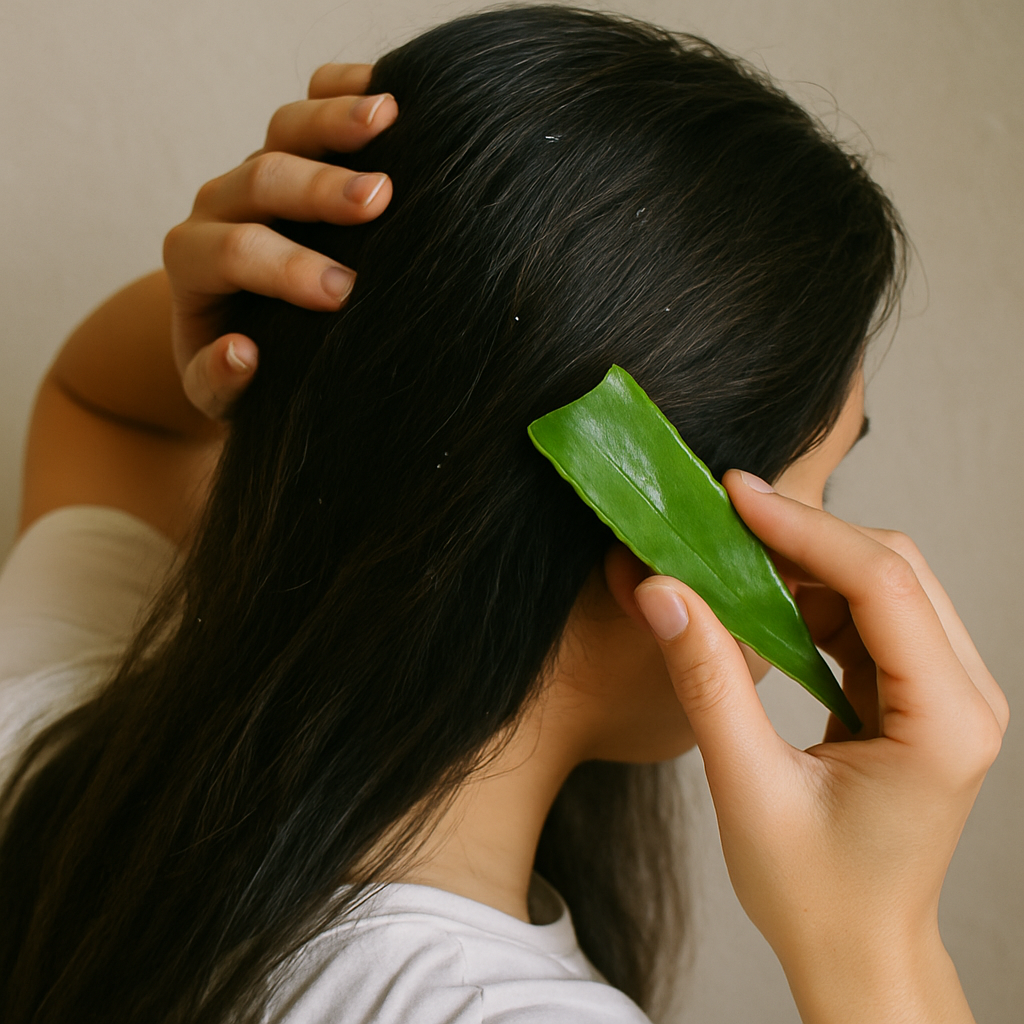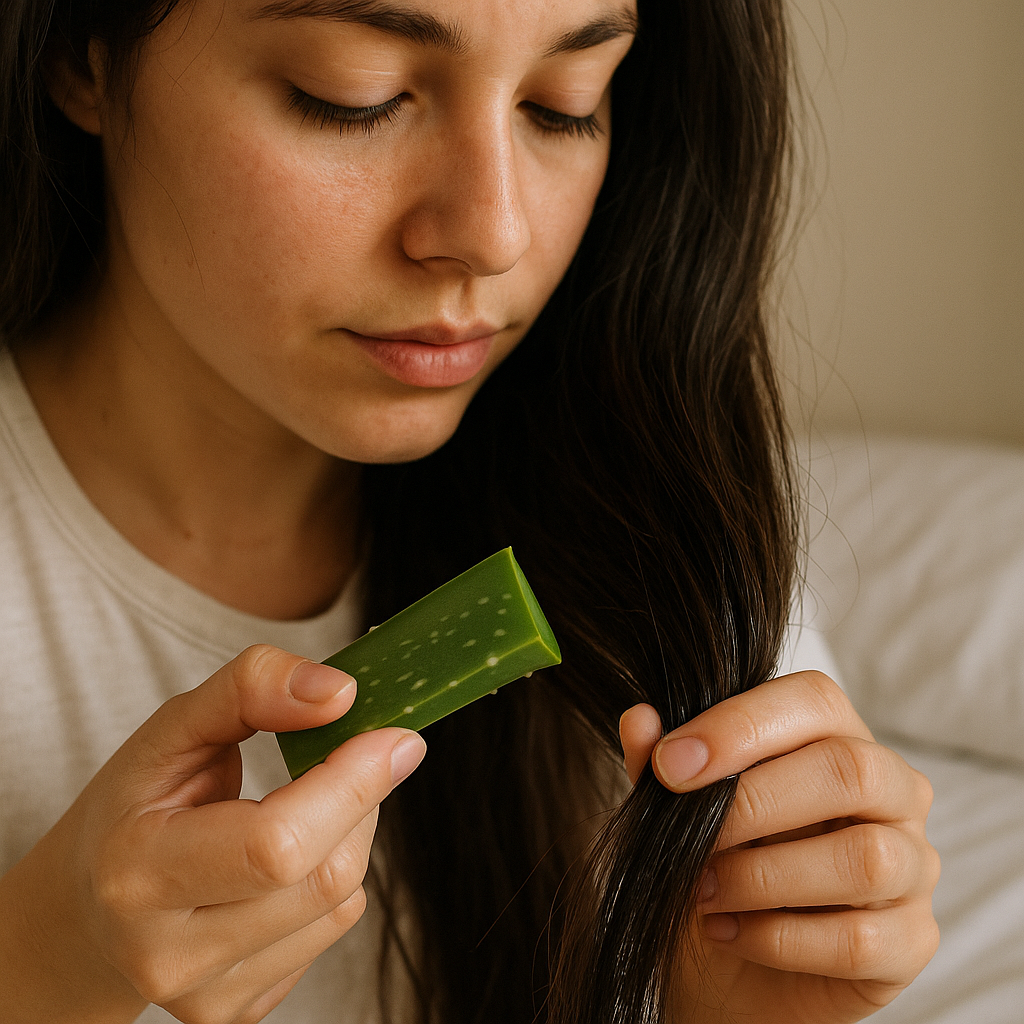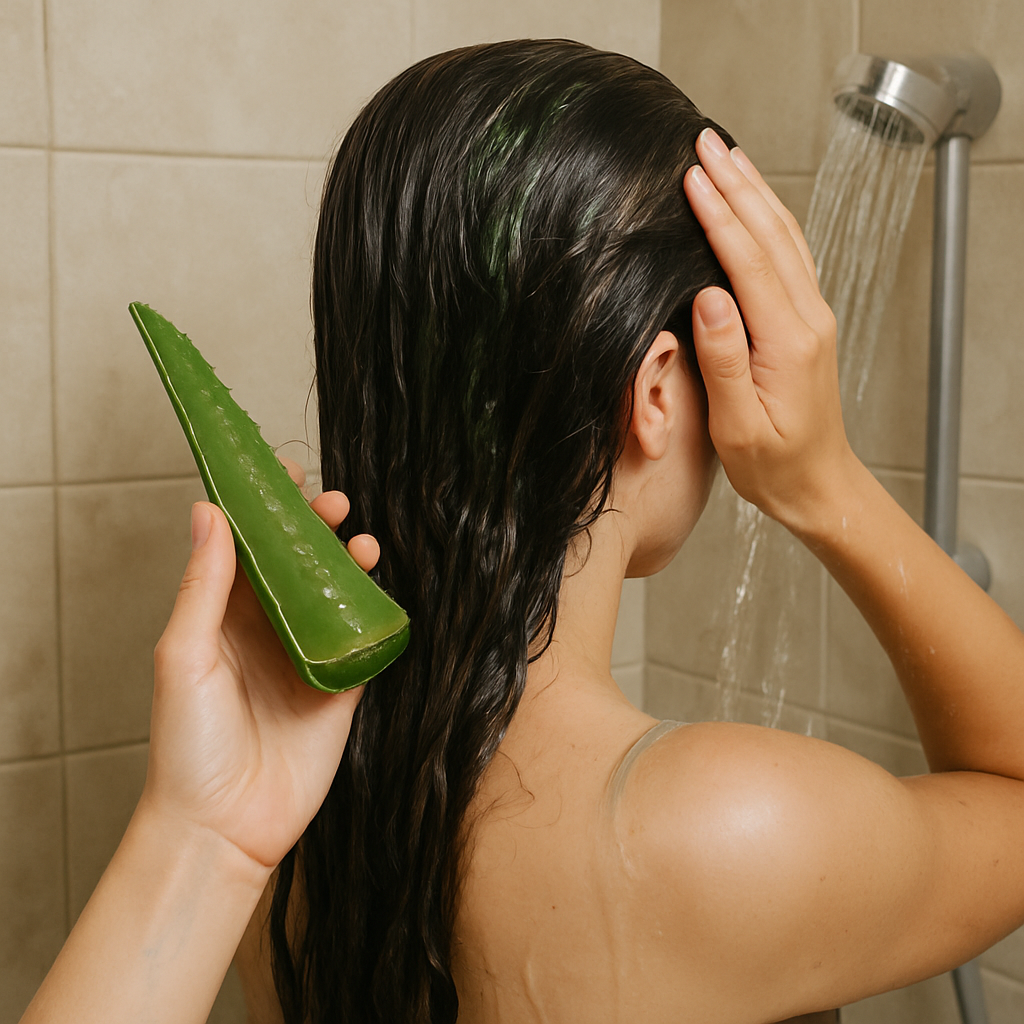Ask Ayurvedic doctor a question and get a consultation online on the problem of your concern in a free or paid mode. More than 2,000 experienced doctors work and wait for your questions on our site and help users to solve their health problems every day.
How to Apply Aloe Vera on Hair: Ayurvedic Benefits, Methods, and Results

If you’ve ever wondered how to apply aloe vera on hair or questioned whether it’s truly worth the hype, you’re not alone. This green, gel-filled miracle from nature’s bounty has taken over beauty routines—and for good reason. Learning how to use aloe vera on hair the right way can transform dull strands into healthy, shiny locks. And guess what? It’s not just a trend—it’s deeply rooted in Ayurveda. From enhancing scalp health to taming dandruff, the benefits of aloe vera on hair are seriously impressive.
But wait... can we apply aloe vera on hair overnight? Is it safe? What about the side effects of aloe vera on hair overnight? Before you slather that gel on, there’s a few things you need to know. This guide is going to break it all down: from how long to leave it in, to how to apply aloe vera on hair for dandruff, to after applying aloe vera on hair how to wash it. Let’s get into it.
Why Aloe Vera Is Good for Hair According to Ayurveda
Ayurvedic Perspective on Aloe Vera for Scalp and Hair Health
In Ayurveda, aloe vera (called Kumari) is considered a cooling and moisturizing agent that balances pitta dosha, the fiery energy often responsible for inflammation and itchiness on the scalp. It’s believed to rejuvenate the scalp tissue, boost blood circulation, and nourish the roots.
The mucilaginous texture of aloe makes it perfect for locking in moisture, especially for dry or heat-damaged hair. When used regularly, aloe can promote healthy follicle function, which is foundational in Ayurveda for hair longevity and vitality.
Is It Good to Apply Aloe Vera on Hair Regularly?
Short answer? Yes, mostly. Regular application can prevent build-up, soothe irritation, and help control excess oil. But (and it’s a real but here), overuse might make the scalp too cold or lead to protein sensitivity in rare cases. So 2-3 times a week is generally more than enough.

Don't wait or self medicate. Start chat with Doctor NOW
How to Apply Aloe Vera on Hair Properly
How to Use Aloe Vera on Hair
First, you want to start with fresh aloe vera gel. If you're lucky enough to have an aloe plant, simply cut a leaf, scoop out the gel, and blend it into a smooth consistency. Store-bought gel is fine too—just go for one with minimal additives.
To apply:
-
Part your hair into sections.
-
Use your fingers or a brush to massage the gel into your scalp.
-
Work it down to the ends, especially if you have dry or split ends.
-
Leave it on for at least 30 mins.
A little tingling is normal, but burning? That’s your cue to rinse, like, now.
How to Apply Aloe Vera on Hair for Dandruff or Dry Scalp
Mix aloe vera gel with a few drops of tea tree oil or lemon juice—both have antimicrobial properties. Apply this blend directly to your scalp and let it sit for about 20-40 minutes. This combo fights flakes and soothes the itch like magic (or science, really).
Another trick? Mix aloe with coconut oil. It not only helps dandruff but also deeply conditions your hair. Double win.
How Much Time to Leave Aloe Vera on Hair Before Washing
Good question. How much time aloe vera on hair depends on your needs. For a quick moisture boost, 30 minutes will do. For deeper repair, you can stretch it to an hour. Some folks even do overnight treatments—but we’ll get to that and the side effects of aloe vera on hair overnight soon. Just don’t overdo it your first time.

Benefits of Applying Aloe Vera on Hair
Benefits of Aloe Vera on Hair Growth and Shine
Let’s be real—everyone wants that shiny, voluminous, I-woke-up-like-this kind of hair. One of the biggest benefits of using aloe vera on hair is how it supports natural shine while boosting growth.
Aloe vera contains enzymes that repair dead skin cells on the scalp. That might sound technical, but think of it as a gentle cleanse-meets-therapy session for your hair follicles. The enzymes unclog blocked pores, allowing fresh, oxygenated blood to nourish the roots. That’s why one of the standout benefits of aloe vera on hair is growth.
Also? There’s this neat little thing called proteolytic enzymes in aloe vera. They help break down excess oil and dead cells, letting your scalp breathe. That means stronger roots, and—yup—shinier strands.
Honestly, if you’ve ever doubted is it good to apply aloe vera on hair, just give it three weeks. You’ll probably notice the difference. Unless you're doing everything wrong (which, don’t worry—we won’t let happen).
Benefits of Aloe Vera on Hair Overnight
Now, about can I leave aloe vera on my hair overnight...
Yes, you can. Should you? That’s a maybe.
Leaving aloe vera on overnight gives it more time to deeply hydrate the hair shaft. For folks with thick, coarse, or very dry hair, sleeping in aloe gel (maybe mixed with a bit of coconut oil) can do wonders. It adds moisture, seals the ends, and makes the morning detangling session way easier.
One of the hidden benefits of aloe vera on hair overnight is frizz control. It’s not magic, but it’s pretty close. You wake up with softer, smoother hair that feels like you just stepped out of a leave-in treatment commercial.
But—read this twice—don’t do it every night. Overuse can lead to buildup and weigh your hair down. Also, sensitive scalps? Proceed with caution. You don’t want an itchy surprise at 3 AM.
Benefits of Using Aloe Vera for Oily, Damaged, or Dull Hair
Aloe is also a secret weapon for folks with oily or damaged strands. If your hair gets greasy within hours of washing, aloe's natural astringent properties help rebalance sebum production without stripping your scalp.
For damaged or color-treated hair, aloe works like a leave-in conditioner that doesn't feel heavy. It’s rich in vitamins A, C, and E—your hair’s fav alphabet—which all promote cell turnover and healthy shine.
If your hair’s looking lifeless or feeling like straw, try this: mix aloe gel with a few drops of argan oil and apply it from mid-length to ends. Let it sit 45 mins, then rinse. You'll probabaly thank yourself (and maybe even this article).

Side Effects of Aloe Vera on Hair Overnight
Okay, time to address the not-so-fun part. Aloe vera is natural, yes, but “natural” doesn’t mean “risk-free.”
The side effects of aloe vera on hair overnight include:
-
Scalp irritation, especially if you have sensitive skin or open wounds.
-
Dryness or stiffness if used too often or not rinsed properly.
-
Weird smell in the morning (seriously, it’s real).
Always, always do a patch test the first time. Apply a small amount to your inner elbow or behind the ear and wait 24 hours. No reaction? You’re good to go. Otherwise, skip it or dilute it with carrier oils.
After Applying Aloe Vera on Hair: How to Wash It Properly
So, you’ve slathered your scalp in gel, maybe left it overnight, and now it’s wash time. But after applying aloe vera on hair how to wash it properly? A quick rinse won’t do the trick—especially if you’ve mixed it with oils.
Here’s a simple, no-fuss method:
-
Rinse with lukewarm water first to loosen the aloe.
-
Use a mild shampoo — preferably sulfate-free — to fully remove any residue.
-
If aloe was mixed with oils (like coconut or castor), you may need to shampoo twice.
-
Condition as usual if your hair tends to get dry post-wash.
Oh, and don’t freak out if the gel feels a little slimy when rinsing—it’s normal. Just keep rinsing until your hair feels clean and not sticky. And no, you don’t need boiling hot water. That’ll just mess with your scalp’s natural oils.
Conclusion
So, let’s rewind: Can we apply aloe vera on hair? Absolutely. And the benefits of applying aloe vera on hair—from soothing dandruff to boosting shine and hydration—make it one of the easiest, most effective natural hair treatments around.
You’ve learned how to apply aloe vera on hair, how to use aloe vera on hair for dandruff, dryness, and oil control, and even how to navigate those tricky side effects of aloe vera on hair overnight. Whether you’re treating itchy scalp, split ends, or just need a shine boost, aloe vera’s got your back (and your scalp).
Just remember to listen to your hair. It’s not a one-size-fits-all miracle gel. Some folks see major improvements in weeks, others need to tweak their routine. And always patch test—no one wants a surprise rash.
So next time someone asks, is it good to apply aloe vera on hair? You’ll know the answer: yep—but only if you use it right.
FAQs
What are the benefits of applying aloe vera on hair regularly?
Applying aloe vera regularly can:
-
Soothe scalp irritation and itchiness.
-
Reduce dandruff naturally.
-
Stimulate healthy hair growth by improving scalp circulation.
-
Add natural shine and softness.
-
Help repair damage from heat or coloring.
Consistency matters, but don’t go overboard. 2–3 times a week is ideal for most hair types.
Is aloe vera safe for dandruff-prone or oily scalps?
Yes! In fact, aloe is especially beneficial for those dealing with flakes or oiliness. Its natural enzymes and anti-inflammatory properties help clear clogged follicles and rebalance scalp oils. Just avoid mixing it with heavy oils if you already have an oily scalp.
Can aloe vera be mixed with oils or herbs for better results?
Definitely. Aloe vera plays well with:
-
Coconut oil: for moisture and frizz control.
-
Castor oil: for hair growth support.
-
Tea tree oil: for scalp health and anti-dandruff.
-
Neem powder: for intense dandruff or fungal issues.
-
Fenugreek seeds: soaked and blended with aloe to boost hair strength.
Just make sure to blend the mix well and rinse it out thoroughly!
Final Tip
If this helped you, don’t keep it to yourself! Share it with a friend who’s been googling how to apply aloe vera on hair and getting overwhelmed. Better hair days are just a gel-scoop away 🌿

